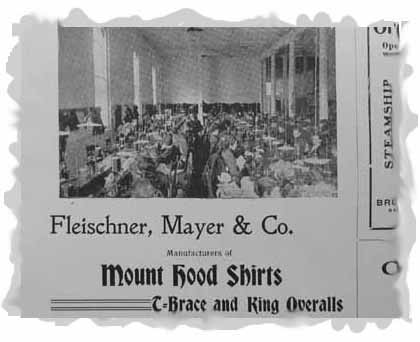| ................ . to Part: 1 2 3 4 |
MARSHFIELD SUN ANNUAL JAN. 1901 SPECIAL EDITION Part 5 compilation copyright (c) 2005 by Marilee Miller : NO COPYING OR DISTRIBUTION of this document without permission.. Text-only version, free copy, please go back to Sun Annual Part 1. Part 5. #50= E. A. Anderson, Mayor of Marshfield #51= Johnson's sawmill #52= Hotel Coquille #53= Norway Creamery #54= Pioneer Days in Coos... Empire City; early customs; Indians; coal deposits; RR dreams #55= Court House, Coquille #56= J. L Ferrey; Blanco Hotel #57= Bandon Woolen Mills #58=. Farmers' Cooperative Commission Company. #59= E. Dyer, sawmill # 60= McCann sawmill. #61= Oregon Coal & Navigation Co. #62= [ad] /////// |
| (pg. 23)... # 50 |
________________ E. A. ANDERSON _____ The present Mayor of Marshfield, Mr. E. A. Anderson, is eminently qualified to occupy the highest office within the gift of her citizens [sic]. His capable direction of municipal affairs has clearly proven his executive ability, and it is evident to all that he is the right man in the right place. As a public official he is always affable, gentlemanly and approachable. Mr. E. A. Anderson was born at St. Peters, Prince Edwards [sic] Island, May 20, 1842. In 1868 he removed to California and one year later to Marshfield. In 1878 he became engaged in the livery business, and has followed it ever since, and today has one of the finest livery businesses in Coos county. In December, 1899, he was elected Mayor of Marshfield. |
| (pg. 12, 23-4) # 51 |
_______________ ALFORD [sic] JOHNSON _____ Mr. A.. Johnson was born in Sweden in 1845. When but 10 years old his parents emigrated to the United States and located in Chicago, Ill. In 1858 he removed to Michigan, where he followed the lumber business until 1889. Twenty-one years of this time he was with the Stromach Lumber Company of Manisle, the last 11 years of which he was superintendent of the company. In 1889 he removed to California and started the Usal [sic] Redwood Lumber Company in Mendocino county. In 1898 he disposed of his interest in Mendocino county, and came to Coos county, Oregon, and took charge of his present plant. In 1899 Mr. D. S. Albert, formerly with the Cotteneba Lumber Company, in Mendocino county, Cal., became a member of the firm. Mr. Johnson was married in 1869 to Miss Georgie Ann McClintock, of Wisconsin, to whom have been born three sons and four daughters, the eldest child being Mrs. Albert. Alford [sic] Johnson, Jr., is foreman at the mill. Mr. Johnson affiliates with the R. A. M, K. T., A. F. of A. M., and A. O. U. W _______________ JOHNSON & CO. SAWMILL. _____ Johnson & Co.'s sawmill, of whose plant we present an engraving, is one of the best equipped and managed sawmills in Coos county. In 1898, when Mr. Alford [sic] Johnson bought this mill, it had a capacity of only 16,000 feet per day; at present it has 30,000. Then it employed 15 men, while today they give direct employment to over 50 men and indirectly to a great many more. It is equipped with all of the latest improved machinery, including double circular and rip saw, surface matchers, stickers, trimmers, etc. The main line of the Marshfield & Myrtle Point Railroad runs directly through their yards, which are situated on the Coquille river just two miles above Coquille City, thus giving them both rail and water facilities for shipping purposes. On the river front they have dockage for one and one-half million feet of lumber, and vessels for San Francisco and other ports are loaded direct from their docks. They also conduct a general mercantile store, which is under the efficient management of Mr. D. S. Albert, the junior member of this firm. |
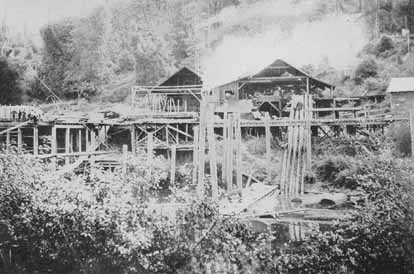
| (pg.14,23) # 52 |
_______________ HOTEL COQUILLE _____ This is the only first-class hotel in Coquille, and was erected in 289 by a stock company, and purchased by Mr. John Curren in July, 1899. It is right in the center of the city. It has 25 large, home-like rooms on the second and third floors. The main office is well arranged, supplied, as it is, with all the conveniences usually found in a first-class house; also three sample rooms for commercial travelers. The dining-room is on the ground floor, and is furnished in a tasty manner, and the table is supplied with all the market affords, and is deservedly the popular resort of the traveling people. |
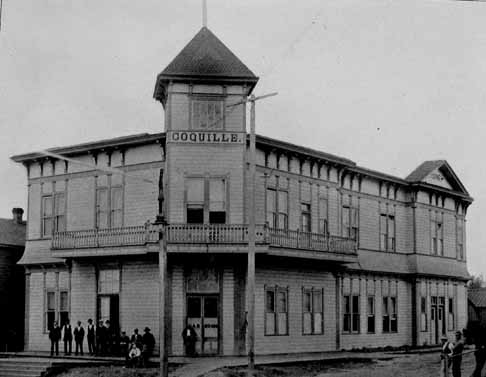
| (pg.19,24) # 53 |
_______________ NORWAY CREAMERY. _____ The above is one of the best conducted creameries in the county. It is located on the Coquille river at Norway, Coos county, and although it has only been established a short time, it has won a name for itself amongst the dairy industry [sic] that many of the older creameries would be pleased to have. This is no doubt due to the efforts of its owner, Mr. Geo. S. Davis, whose uprightness and fair dealings have won him friends on all sides. An engraving of his plant appears in this issue. |
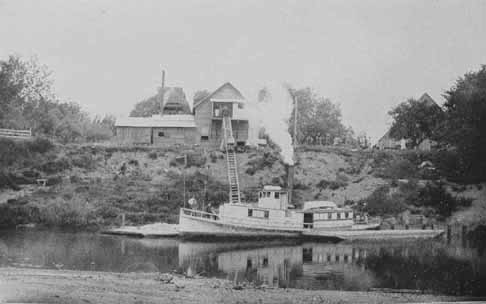
| (pg 24-5,9) # 54 |
_______________ PIONEER DAYS IN COOS. _____ Empire City, The Oldest Town in the County. In 1855 William V. Wells made a pilgrimage with a companion through this section of Oregon and afterwards wrote a story of his journey for Harper's, from which a few extracts follow. Empire City. "Remounting [illegible; we?] struggled along through the labyrinth of trunks, until at sundown a slight rise in the ground gave us a glimpse of daylight through the forest. A citizen of Empire City suddenly appeared and paused aghast in his route at sight of two strangers. The grip on his trusty rifle was a little tightened as we approach, but seeing we were immigrants, and probably not connected with any of the local issues of Coos Bay country, he shouted: " ' Dern my skin, but when I heered the brush a crackin' I thought I had ketched that cow at last. How are ye, strangers -- bound to Coos?' "We reply, and after a brief interchange of news, we pursued our way. He pointed out, as we parted, the graves of five children who had been crushed by the falling of a tree some twelve months before. "After the discovery of the coal deposits, there was a rush of some 20 families to the mineral region, most of whom cleared and claimed, under the law of 1847, 640 acres of land each. To avoid the danger of falling trees, it is necessary to burn and fell all suspicious ones within a few hundred yards of the dwelling. One night the father heard crackling in the direction of a giant pine which had been steadily consuming under the action of fire for a week past. The family was asleep but like lightning the danger flashed upon the settler, and arousing his wife, they seized two of the children, and hurried the bewildered little flock into the night air. But the warning had come too late. As they issued from the hut, the tree -- a monstrous tower of wood, little lower than the cross of Trinity Church in New York -- toppled from its center and fell to the earth. The cabin was directly in a line with its descent, and was smashed to atoms. The little mound, over which clamber a few blackberry vines, marks the lonely grave. 'As we neared the edge of the forest, the regular strokes of an ax resounding in echoes through the shadowy silence, showed we were nearing our place of destination. The horses, now quite worn down with the wearisome route, pricked up their ears at the sound, and quickening their pace, we issued from the woods upon the banks of a beautiful and spacious bay, stretching some three miles directly beyond us, and about five in the right and left. The surrounding woods were clearly depicted in its glassy surface, while the swelling tide swept nobly up to the spot where we stood. It was the famous Coos Bay, of which some indistinct accounts had reached San Francisco, but which, passed over in the reconnaissance of the United States Coast Survey, had remained unexplored and almost unknown. Indeed, no maps or charts, save the one afterward made by myself from rough sketches, exist of this fine sheet of water. "To the right lay the little town of Empire City -- every collection of dwellings in Oregon and California is a City -- composed of some 30 houses, mostly of boards, and from the midst of which a half-finished wharf projected into the bay. A hasty glance at the scene sufficed: for our animals were already gazing wistfully at the place, with visions of corn or barley, doubtless, rising in the dim perspective [sic]. So with as brisk a gait as we could assume, we entered the town -- the entire population completely electrified by our arrival, and crowding around us as curious specimens of humanity, which in truth, we were. "Our friend, Mr. Rogers, hastened out to meet us; and rescuing his visitors from the crowd, hurried us into his store, where we were not long in making ourselves at home. "Behold us now before a crackling fire of pine-knots, alternately sipping the contents of a copious bowl of whiskey punch -- and such whiskey, shade of Baccus! and detailing to the attentive listeners the news from ' Frisco ', as San Francisco is here familiarly termed. The mail facilities between Coos Bay and the great commercial metropolis of the Pacific are extremely uncertain and by no means regular, so our arrival was a matter of the greatest moment. "Mr. Rogers' store is the commercial and political headquarters of Coos Bay. The stout proprietor himself, a rosy-cheeked, educated Vermonter, has held some of the most important offices in the gift of the people [sic], and his hearty manners and good natured laughs have won for him the reputation of the most popular man at Coos. The store is the resort of the inhabitants for many miles around on Sundays, when, seated on the counter, they discuss the most important tropics, and select goods from the assortment of our host. The glance around the shelves revealed the extent of his stock, which, as a racy informant remarked in answer to my look of inquiry, consisted of ' green groceries ' -- i. e., black thread and vinegar! "As the fire lighted up the interior of the rough dwelling, and brought into bold relief the stalwart forms of men whose tastes and occupations had led them into this corner of the world for a livelihood, it was difficult to realize that four years ago the bare existence of such a place as Coos Bay was unknown. "The evening wore away with songs and stories, jolly great pipes of tobacco black as sooty Acheron were smoked and refitted, more logs were piled upon the fire, and rough jokes flew around the merry circle. At last, weary with the ride, and perhaps a little overcome by the hospitality of our entertainers, we were shown to a species of shed, the sign over the door of which read thus: PIONEER HOTEL -- DONUTS -- WOM MEELS. And denoted the sole public house of Empire City. Here, we addressed ourselves to sleep and after a round twelve hours, came out on the following day, brisk as larks and prepared to see the lions. "Coos Bay is about twenty miles in length and from three to four in width. It is entered from the ocean -- or, rather, the ocean discharges [printout illegible] habitants [printout illegible] by a narrow channel, perhaps half a mile wide from land to land. The navigation is somewhat intricate, but not dangerous. There is depth of water for vessels loaded to ten or twelve feet, and numerous cargoes of coal have been taken to San Francisco -- a distance of about four hundred miles. The mines are some twenty miles from the bar or entrance, and facilities already exist for the rapid loading of vessels. The coal, which extends over a country some thirty miles by twenty is abundant, accessible, and of good quality. As yet only a few banks have been opened. An immense trade -- that of supplying the Pacific coast with coal -- is destined to spring up between this point and California. "During our four months stay at Coos and vicinity, we took frequent advantage of the numerous offers of our acquaintance to make excursions across and up the bay, sometimes to join in the excitement of the chase, salmon fishing, or surveying the interesting country about us. The scenery around the bay is made up of deep, silent pine and fir forests, often relieved with the gayer-tinted foliage of the birch and maple. Toward the ocean, where the northwest winds prevailing in the summer months have heaped up symmetrical mounds of sand, all traces of vegetation disappear and a desolate expanse of white mingles in the horizon with the blue line of the sea. An incessant roar, mellowed by the distance into a hoarse murmur, marks where the surf chafes among the rocks skirting the entrance to the bay. "Days and weeks may pass away, and if you go beyond the small circle of civilization around the town you will meet with no living thing but the passive Indian squaw dragging her load of fish to the cabin, or some startled wild beast, quickly darting out of sight into the depths of the woods." Indian Dance and Burial. An Indian dance or merry-making having been announced near the bay, the whole available population turned out to assist at it. Entering an open space in the woods toward midnight, we found about thirty braves and squaws gathered around an immense fire of pine logs, the flames from which lit up their grotesque accoutrements [sic] and hideously painted faces, while the surrounding forest echoing their monotonous [sic] chants, was dimly illumined with the red glare. For a space of twenty yards around the fire the scene was a blaze of light, but from that point the woods receded into an impenetrable gloom. We dismounted, and fastening our horses to the limbs, entered at once among them. Here an old squaw, whose leathern [sic] hide, naked from the waist up, lay like the folds of oiled parchment over her attenuated form, sat rocking herself to and fro, mumbling an indescribable jargon. She was stone blind. There a bevy of young ones, tattooed and bedaubed beyond all descriptions, joined their voices to a jumping, jolting dance, hand in hand, back and forth, toward and away from the fire. Beyond were seated as near to the flames as the heat would allow, a row of Indians all fantastically dressed, beating time to the chant with sticks, which they held crossways in their hands, and at given signals rattled nervously together. "Several old chiefs seemed to act as leaders in the [printout illegible; festivities?] and at their signal a wild, unearthly yell arose, which, but for the presence of my companions, I might easily have construed into a war- whoop. All were in motion; rocking, dancing, jumping or stepping, in uncouth gait, to the time of the music or chant. Perspiration flowed in streams, and the decidedly careless display f female animated nature would have driven less interested, and perhaps more scrupulous, spectators than ourselves from the scene. As the flames roared their chorus with the hideous noise of these creatures, it seemed like a dance of fiends incarnate in some orgie of Pandemonium [sic]. Hanging up in elongated wicker baskets, so closely woven as to be water-proof, were some dozen papooses strapped to the straight back of these portable cradles, and nothing but the head of the little imps visible from among the fire and dirt. "An Indian burial is scarcely a less remarkable scene. Formerly the body was burned, and the wife of the corpse killed and interred with the body. This, and numerous other like horrible practices, have been summarily abolished by the settlers. When one of the community begins to show signs of dissolution (which is usually hastened by the sweating or other sanitary process to which the sick are submitted) [sic], the whole tribe commences a terrible outcry which generally lasts through the dying agony of the sufferer. The body is then stretched upon the ground and sprinkled with sand and the ashes of sea-weed or kelp. The legs are forcibly doubled up toward the head, and the ankles tied as closely as the rigidity of the corpse will permit, to the neck. The relatives of the deceased shave their heads and place the hair upon the body -- thus rolled into a heap -- together with some shells and nutritive [sic] roots for the dead to subsist upon. The body is then lowered into the grave, which is made of a length to accomodate the dimunition [sic] of size to which the defunct has been submitted. The earth being thrown in, the whole tribe jump alternately upon it until the ground becomes quite solid. The baskets, clothing, spears and all personal property is formed into a heap, packed upon the grave, and covered securely with sticks and stones. With a chief, the ceremonies are more impressive and lengthy." . . . . . . . . . . . . . Fashionable Ball. "For some weeks previous to Christmas great preparations had been made for the observance of that time-honored anniversary. Now, in Oregon, where people reside ten miles apart, and call a man neighbor who lives a half a day's journey away, it is not so easy to make up a fashionable party, for sundry reasons, as in Fifth avenue, or any other of the 'close settlements' in New York. If a hop is to take place, weeks must be given to prepare in: the 'store clothes' taken out, aired and brushed, old bonnets furbished up, horses driven in from distant pasture, and saddles made ready. Then the nearest settlement must be applied to for a proper amount of whisky and sugar, raisins and flour. But on the occasion above alluded to, great efforts were made to ave matters go off with eclat. Deacon I.-----, residing on the ocean beach, about twenty miles to the southward of Coos Bay, and known as the most liberal, warm-hearted old gentleman of Southern Oregon, had appropriated, some time in advance, the right to give the Christmas ball. It was to last two days and two nights. Oceans of whisky, hills of venison and beef, no end of pies and 'sech like.' The ladies of all Coos county were to be there, and a fiddler from the distant point of Port Orford itself engaged. To this feast did all hands look forward with secret longing and hope. Two days beforehand the exodus for Deacon I.---- -'s began to take place, and among the invited guests were the two 'Frisco chaps,' i. e., H----- and myself. And on Christmas eve the ball commenced. There were gay roystering blades [sic] from Port Orford, select men and distinguished individuals from all over the country, and belles from everywhere. Such a recherhe [sic] affair had not occurred since the settlement of the territory. For two nights and days the festivities continued; and after all the dancing, riding, drinking, singing and laughing - - and all this without sleeping, and with a determination to 'never give up' -- there were buxom forms and brilliant eyes that dared us to another break- down! "I snap my fingers at all civilized Miss Nancys henceforth and forever. Give me, for the essence of fun and the physical ability to carry it out, a corn-fed, rosy-cheeked, bouncing Oregon lass, with eyes bright as the rivers that sparkle merrily on their way to the sea from those snow-clad mountains, and hearts as light as the fresh breezes of that northern climate! I may forget the Central American excitement; sooner or lated [sic] I shall have forgotten the birth of an heir to the French throne; the siege of Sebastopol bay [sic] fade away, but that Oregon ball will be ever fresh in my memory." . . . . . . . . . . Coal Deposits Then Known. "The coal deposits of Coos Bay should be the subject of a separate article, and require more space than could be devoted to them in the limits of these pages. A report, recently published by myself in San Francisco, contains the outlines of what will doubtless become hereafter widely discussed. That the importation of coal to California via Cape Horn from Europe and the Eastern states must eventually cease, few who are acquainted with the facts wills deny. A space of country about the size of Rhode Island is a solid bed of coal, outcropping wherever a ravine or break occurs. The veins are from 6 to 10 feet thick. It has been satisfactorily tested and proved to be well adapted to steamship purposes. It is in quality not unlike the Scotch cannel [sic], but lighter, and when unmixed with foreign substances burns to clear red ashes. But these are only a few of the boundless treasures of the region of the Pacific, and which, as the country becomes populated, are destined to taech [sic] the inhabitants of the extreme West to rely on their own resources. California and Oregon produce nearly every article necessary to the comfort and subsistence of man, and it needs but the construction of the great avenue of population - the national railroad - to bring the country to the pinnacle of greatness and wealth. Shall we live to see it built?" |
| (pg. 17)... # 55 |
_____________ [Coos County Courthouse] ______ |
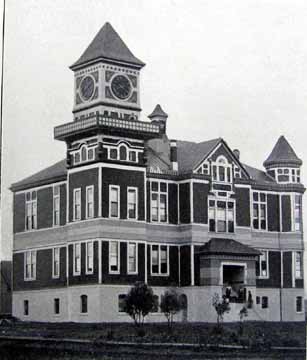
| (pg.13, 23, 29) # 56 |
_________________ J. L. FERREY, BLANCO HOTEL _______ |
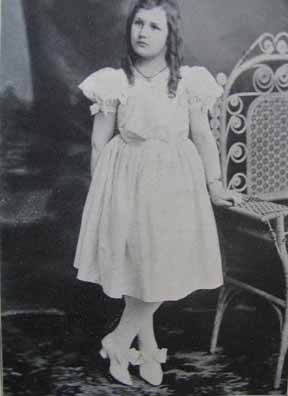
| xxxxxxxx |
_______________ BLANCO HOTEL. _____ To the weary traveler, who may perhaps be begrimed with dust or nearly frozen with the cold, nothing is more welcome than a comfortable hotel with a pleasant landlord and a cheerful fire. To the traveler such a hotel is a godsend, and a hearty welcome is sometimes as beneficial as a hearty meal, and to all who travel into Coos county we say by no means forget to stop at Marshfield, and call on the genial proprietor of the Blanco Hotel, where you will be cordially welcomed and royally treated. This is the only first-class hotel in Marshfield, and is under the able management of the owner, J. L. Ferrey. It is right in the center of the city. Its sleeping rooms are large and homelike. The office is well arranged, supplied, as it is, with all the conveniences usually found in a first-class house. The dining-room is large and is furnished in a tasty manner, and the table is supplied with all the market affords. No expense has been spared in furnishing the house, and its immense patronage proves the popularity. |
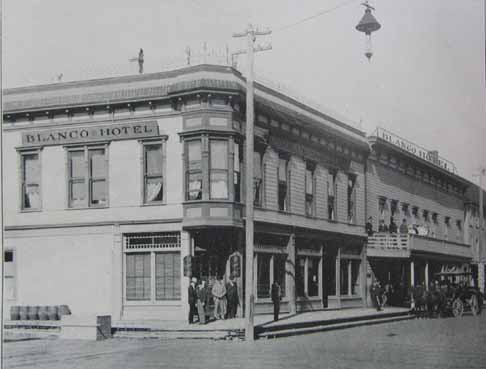
| (pg,12, 30) # 57 |
_______________ BANDON WOOLEN MILLS. _____ Probably no enterprise inaugurated in Coos county during the past eight years gives employment to more people or is more thoroughly appreciated than the Bandon Woolen Mills. It is a "three-set mill", and employs from 45 to 55 people, with a payroll of $1,750 per month. This mill makes a specialty of flannels and all-wool blankets. Their blankets have gained for this mill a reputation with the trade second to none in the state. These mills were established in Bandon in 1893 by T.W. Clark, H. Z. Burkhart and F. E. Palmer. One year later Mr. Clark bought out Mr. Burkhart's interest. |
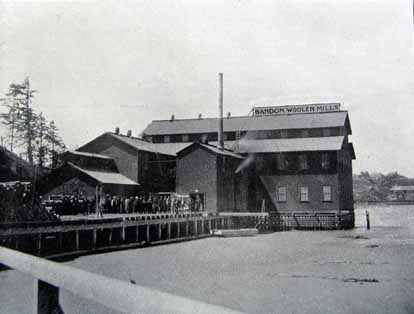
| (pg. 30)xxx # 58 |
_______________ FARMERS' CO-OPERATIVE COMMISSION COMPANY (INC). _____ Dealers in All Kinds of Produce, Feed and Grain, 125 Front Street. _____ Portland, Or., Jan. 3, 1901. Farmers of Oregon: We wish to call your attention to the Farmers' Co-Operative Commission Company. It was organized for the purpose of marketing the produce [printout illegible] farmer at [printout illegible] is incorporated under the laws of Oregon [printout illegible] has set out [printout illegible] business justly and fairly between the producer and the consumer. It is to belong to the farmers themselves, be managed for their best interest and be controlled by them. They will own the stock, elect the officers of the company and control its affairs. Belonging to the farmers, there will be no desire for the farmers to make a profit off of themselves; therefore, it will be run at cost to members. Many farmers complain, and justly, that the commission men take advantage of them, selling their produce on a high market, report it sold on a low market and thus cheat them out of 10 to 15 per cent on many of their shipments, besides charging their regular commission. The Farmers' Co-Operative Commission Company, being composed of farmers will never rob or defraud its members. They will always get exactly what their produce brings on the market minus 2 1/2 per cent, the exact cost of marketing. The books of the company will always be open to all members alike, and any one shipping produce to its store can find out exactly what their produce sold for by examining the books. A commission of 2 1/2 percent will be charged for handling produce, which is 50 per cent less than is charged by commission merchants, and at the end of every six months a dividend will be declared, which will return to members all money thus accumulated over and above actual economical running expenses. In addition to the above advantages the company will act as purchasing agent for its members free of cost, thus securing any and all goods desired by them at wholesale prices. Why constantly pay 5 per cent to commission men, many of whom are unscrupulous to sell your produce for you and beat you out of from 10 to 25 per cent of the price of your products? Why pay $10 to a "home supply association" to buy goods for you when by becoming a member of the Farmers' Co-Operative Commission Company you can get your produce handled at cost, without stealage [sic], and buy your goods at wholesale prices, without paying [printout illegible] the privilege? The incorporators of the Farmers' Co-Operative Commission Company are well known reputable business men, well able to conduct the business until the farmers subscribe to the stock of the company and elect a new set of officers. They know that upon the prosperity of the farmer depends the prosperity of everybody else, and they desire to see the farmer prosper. That is why they have undertaken to help the Farmers' Co-Operative Company along. We solicit your careful attention to this matter, and trust you will become a member of the company. If you wish to become a member all that is necessary is for you to subscribe to the stock of the company and you can pay your subscription either in money or produce. Any consignment you may send in will be sold and the money received for same placed in your credit, and stock to that amount issued you if you so desire. Consignments of produce from non-members will be handled at the regular 5 per cent commission, and no dividends can go to any but members, as all dividends must be declared on stock. The larger number of shares you have, the greater will be your dividends. Don't procrastinate, but become a member of the Farmers' Co-Operative Company immediately and share in the benefits of having your produce handled at cost, your goods bought at wholesale, and in the profits arising from handling the produce of non-members. Address all communications and consign all produce to the FARMERS' COOPERATIVE COM. CO. By D. Miller, Secretary. P. S. A representative of the company will call upon you and explain the workings of the company more fully and take your order for stock. |
| (pg.14,30) # 59 |
______________ E. DYER. _____ The subject of this sketch was born near Port Orford July [printout illegible; 14?]. He received his education in the public schools of Marshfield. After finishing school he accepted a position in a hardware store in Marshfield. In December 1885, he was appointed receiver for Averel [sic] & Albertson's general merchandise store at Bandon. Later his father bought a half interest in the business and two years later Elbert bought Mr. Averel [sic] out, and in 1893 sold to G. W. Williams & Co. Mr. Dyer then removed to California, bought land, set out fruit trees and then returned to Bandon. In 1895 Williams & Co. failed, and he and his father again became owners, but in a short time disposed of the store and shortly afterwards established a broom-handle factory, thus being the first plant of this kind built on the Pacific coast for the exclusive manufacture of broom handles. Since then Mr. Dyer has built three other mills, all of them being within five miles of Bandon. |
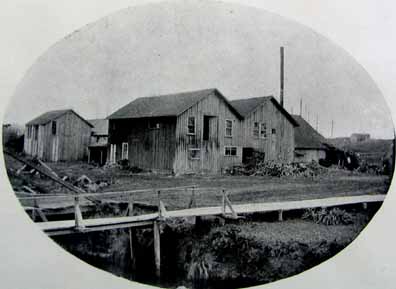
| (pg. 17)x # 60 |
___________ [sawmill near Bandon] ____ |
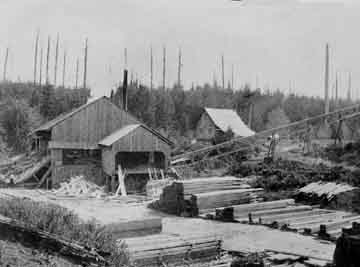
| (pg. 17)x # 61 |
_____________ [Oregon Coal & Navigation Company] _____ |
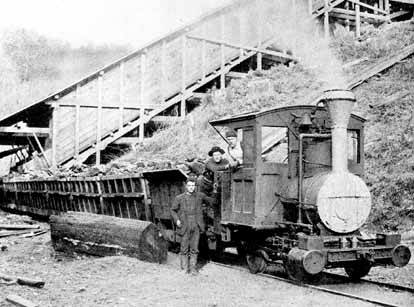
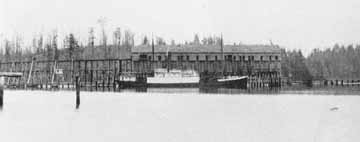
| (pg 28-29, back cover) #62 [Ads] [not copied except -- ] |
